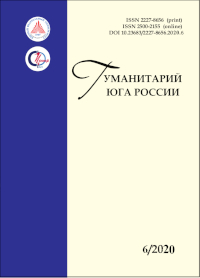Bureaucracy and Culture: Prerequisites for Anonymous Domination and Submission
Research Article
How to Cite
Makarenko ViktorP. Bureaucracy and Culture: Prerequisites for Anonymous Domination and Submission. Humanities of the South of Russia. 2020. Vol. 9. No. 6. P. 191-200. DOI: https://doi.org/10.18522/2227-8656.2020.6.16 (in Russ.).
Abstract
Culture as a way of organizing human relations defies economic and technological logic. Decisions are usually made in specific situations that create uncertainty. It is associated with the free will of individuals who have the ability to create a network of relationships with other people. The abilities of individuals have a cultural and creative meaning. Culture is the main element of organizational life and the main source of individual autonomy. Therefore, bureaucracy is included in the analysis.
This premise is argued on the basis of the analysis of M. Crozier's model of bureaucracy. All countries face a common threat of organizational ethnocentrism. The problem is reduced to the analysis of the reasons for the predominance in the organizational systems of specific countries of the rules of the relationship between bureaucracy and culture. Static approaches to culture understand it as a cultural code that is not able to change a given society and the bureaucracy associated with it. An indeterministic approach to culture interprets the behavior of an individual as an expression of choices that require certain skills and abilities from him. This approach allows one to study the cultural and educational prerequisites for anonymous domination and subordination. It is shown that relations of mutual “avoidance” in each culture form an integral part of the social world and a special ability of individuals. It is shown that relations of mutual “avoidance” in each culture form an integral part of the social world and a special ability of individuals. This tolerance is a cultural ability acquired through interaction with other people. It forms the premise of national models of bureaucracy and cognitive dissonance in any culture.
Keywords:
culture, bureaucracy, cultural and educational prerequisites for anon-ymous domination and subordination, national model of bureaucracy
References
Management history. (2014). Textbook. E.P. Kostenko, E.V. Mikhalkina. Rostov-on-Don: Izdatel'stvo Yuzhnogo federal'nogo universiteta. (in Russian).
Crozier, M. (1993). The modern state is a modest state. Svobodnaya mysl', 11. (in Russian).
Makarenko V.P. (2002). Economic axiology: the experience of studying economic cultures. Obshchestvo i ekonomika, 6. (in Russian).
Spiridonova, V. I. (1997). Bureaucracy and Reforms (Analysis of M. Crozier's concept). M. (in Russian).
Stepin, V.S. Culture. Novaya filosofskaya entsiklopediya. Available at: https:// iphlib.ru/ library/collection/newphilenc/document/HASH4b379ecd7a2f7c0c5fb64b. (in Russian).
Crozier, M., Friedberg, E. (1982). Czlowiek I system: ograniczenia dzilania zespolowego. Przelozyla I przedmowa opatrzyla K. Bolesta-Kukulka. Warszawa. Panstwowe Wydawnictwo Ekonomiczne, 181-205.
Crozier, M. (1993). The modern state is a modest state. Svobodnaya mysl', 11. (in Russian).
Makarenko V.P. (2002). Economic axiology: the experience of studying economic cultures. Obshchestvo i ekonomika, 6. (in Russian).
Spiridonova, V. I. (1997). Bureaucracy and Reforms (Analysis of M. Crozier's concept). M. (in Russian).
Stepin, V.S. Culture. Novaya filosofskaya entsiklopediya. Available at: https:// iphlib.ru/ library/collection/newphilenc/document/HASH4b379ecd7a2f7c0c5fb64b. (in Russian).
Crozier, M., Friedberg, E. (1982). Czlowiek I system: ograniczenia dzilania zespolowego. Przelozyla I przedmowa opatrzyla K. Bolesta-Kukulka. Warszawa. Panstwowe Wydawnictwo Ekonomiczne, 181-205.
Article
Received: 15.10.2020
Accepted: 23.12.2020
Citation Formats
Other cite formats:
APA
Makarenko, ViktorP. (2020). Bureaucracy and Culture: Prerequisites for Anonymous Domination and Submission. Humanities of the South of Russia, 9(6), 191-200. https://doi.org/10.18522/2227-8656.2020.6.16
Section
CULTURE AND GLOBALIZATION






